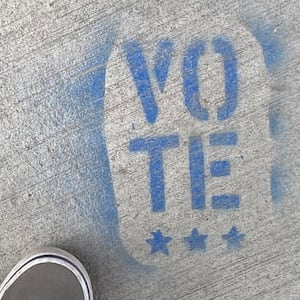cast one’s vote: Idiom Meaning and Origin
What does ‘cast one's vote’ mean?
The idiom "cast one's vote" means to formally make a choice or decision, typically by marking a ballot during an election or voting process.

Idiom Explorer
The idiom "vote with one's feet" means to express one's opinion or preference by taking action, usually by leaving or moving away from a situation or place.
The idiom "cross to take up" means to switch from one side or position to another, often involving a change in opinion or loyalty.
The idiom *courage of one's convictions* means to have the bravery and determination to stand up for what one believes is right or true, even in the face of opposition or doubt.
The idiom "come down to" means to ultimately be based on or determined by a particular thing or set of circumstances. It implies that the final decision or outcome is influenced by a specific factor.
The idiom "come down" means to make a decision or judgment, usually after careful consideration or evaluation.
The idiom "collect one's thoughts" means to take a moment to gather and organize one's ideas or to calm one's mind in order to think more clearly.
The idiom "cast the first stone" means to be the first to criticize or judge someone when you yourself are also guilty of wrongdoing.
The idiom "cast in concrete" means to make something fixed, unchangeable, or permanent. It implies that a decision, plan, or idea is firmly established and cannot be altered. This phrase originates from the process of casting concrete, where it hardens and becomes immovable once it sets.
The idiom "cast aside" means to reject or disregard someone or something, often without considering their value or importance.
The Symbolic Act
The idiom "cast one's vote" has its origins in ancient Roman times, where voting was conducted using small tokens or pebbles called "calcus." Citizens would drop their calcus into a container, which was then counted to determine the outcome. This practice evolved over time and eventually became the basis for the modern idiom "cast one's vote."
The word "cast" in the idiom comes from the Latin word "castus," meaning to throw or toss. This conveys the physical action of depositing a vote into a container, like casting a stone or a pebble. The verb "cast" implies decisive action and the exercise of individual choice.
The word "vote" originated from the Latin word "votum," meaning a vow or a solemn promise. In ancient Rome, voting was seen as a solemn act of pledging allegiance or expressing support for a candidate or issue. This idea of making a vow or promise through voting is still embedded in the modern usage of the word "vote."
The idiom "cast one's vote" refers to participating in an election or decision-making process by expressing one's choice or opinion. It emphasizes personal agency and the exercise of democratic rights. When someone casts their vote, they are actively engaging in the democratic process and contributing to collective decision-making.
The idiom is commonly used in political contexts, particularly during elections or when discussing civic engagement. It highlights the role of individual citizens in shaping society and emphasizes the value of each person's voice and opinion. By casting their vote, individuals become active participants in the democratic process and have a direct impact on the outcome of an election or public policy formation.
However, the idiom "cast one's vote" extends beyond politics. It can describe any situation where individuals express preferences or contribute to decision-making. For example, employees in a company may cast their vote to choose a new team leader, or community members may cast their vote to decide on a neighborhood project. In these contexts, the idiom underscores the importance of individual choices and the collective power of a group to make decisions.
The idiom "vote with one's feet" is related to "cast one's vote." It means to express one's opinion or preference by taking physical action or making a choice with regards to a particular situation. Instead of expressing their choice through voting in a traditional sense, individuals "vote with their feet" by making decisions that align with their beliefs, values, or preferences. This idiom emphasizes the power of individual action and the impact that choices can have on shaping outcomes.
The idiom "cast one's mind back" is also related to "cast one's vote." It means to reflect or remember something from the past. When individuals cast their mind back, they are recalling or revisiting a particular memory, experience, or thought. This idiom reminds us that voting is not just a present action but can also be influenced by past experiences, knowledge, or perspectives.
While the idiom "cast one's vote" has a clear and widely understood meaning, it also signifies the possibilities and potential outcomes within any decision-making process. Each vote represents a unique perspective and has the potential to influence the final result. This idiom reminds us of the power and responsibility that comes with participating in the democratic process or any form of collective decision-making. It embodies the notion that every vote matters and has the potential to shape events.
Example usage
Examples:
- During the election, every citizen has the right to cast their vote for the candidate of their choice.
- It is important to cast your vote in order to have a say in the decision-making process.
- After much deliberation, I finally cast my vote in favor of the new policy proposal.
More "Politics" idioms



